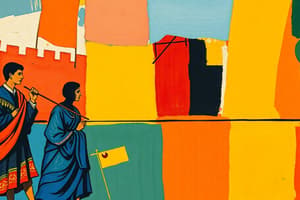Podcast
Questions and Answers
What is the primary focus of historians in their study of history?
What is the primary focus of historians in their study of history?
- To interpret modern issues using historical narratives
- To create myths that reflect cultural beliefs
- To analyze past events and their causes and effects (correct)
- To document only the dates and places of events
How does history differ from myth?
How does history differ from myth?
- History is often supported by verifiable evidence (correct)
- History is less subject to interpretation than myths
- Myths are based solely on written documents
- Myths focus on the factual aspects of the past
Which ancient historian is often referred to as the 'father of history'?
Which ancient historian is often referred to as the 'father of history'?
- Thucydides
- Socrates
- Herodotus (correct)
- Plato
What does the term 'prehistory' refer to?
What does the term 'prehistory' refer to?
What did the Spring and Autumn Annals represent in East Asian history?
What did the Spring and Autumn Annals represent in East Asian history?
Who has been referred to as the 'father of history' in their respective societies?
Who has been referred to as the 'father of history' in their respective societies?
What is the original Greek word from which 'history' is derived, and what does it mean?
What is the original Greek word from which 'history' is derived, and what does it mean?
In which century did the meaning of 'history' shift to refer specifically to 'the branch of knowledge that deals with past events'?
In which century did the meaning of 'history' shift to refer specifically to 'the branch of knowledge that deals with past events'?
Which word describes how history was initially borrowed into Old English?
Which word describes how history was initially borrowed into Old English?
How did the term 'history' evolve in meaning from the 12th century onwards?
How did the term 'history' evolve in meaning from the 12th century onwards?
Flashcards are hidden until you start studying
Study Notes
Overview of History
- History originates from Ancient Greek ἱστορία (historía), meaning "inquiry" or "knowledge acquired by investigation."
- It systematically studies and documents the human past through narratives that describe, examine, and analyze historical events and their causes and effects.
- Historians engage in debates regarding the significance and interpretations of various historical narratives.
Nature of History
- The period before writing systems is termed prehistory.
- History encompasses the memory, discovery, collection, organization, presentation, and interpretation of past events.
- It relies on sources like written documents, oral histories, art, artifacts, and ecological markers for knowledge acquisition.
Cultural and Historical Context
- Stories not supported by external evidence may be classified as cultural heritage or legends, differentiating them from verifiable history.
- Interpretations of history have evolved over centuries, often influenced by ancient cultural perspectives.
Major Historical Figures
- Herodotus, a 5th-century BCE Greek historian, is often called the "father of history," though criticized for inaccuracies, often referred to as the "father of lies."
- Thucydides, a contemporary, focused on military history, forming foundational concepts in historical study.
- In East Asia, the Spring and Autumn Annals represents early historical documentation dating back to 722 BCE.
Etymology of History
- The term history translates as historia in Latin, referring to investigation and description of past events.
- Old English adopted the concept as "stæer," which eventually fell out of use.
- The range of meanings of historia evolved in Middle French into themes of life accounts, chronicles, and eventually a body of knowledge about human evolution.
- By the mid-15th century, the term became restricted to the academic study of past human events.
Historical Development of the Term
- The term gained popularity in Middle English by the late 14th century and reflected varying uses over time.
- With the Renaissance revival, Francis Bacon defined history as knowledge determined by spatial and temporal understanding, distinguishing it from science and poetry.
Studying That Suits You
Use AI to generate personalized quizzes and flashcards to suit your learning preferences.




